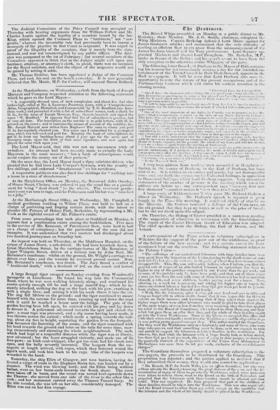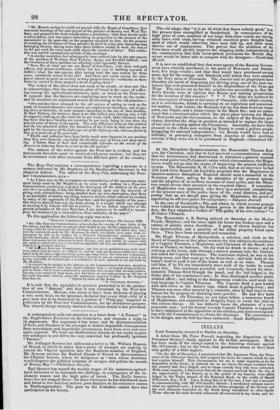A correspondent of the Times refers to - voluntary subscriptions in
Wiltshire for the support of the poor out of the workhouse, as proof of the failure of the new system : and, to a certain extent the facts mentioned bear out the assertion. The following statement relates to the Tisbury Union-
" The sufferings of our agricultural labourers with large families have been very great front the formation of the Union, (owing to the disallewance of out-
door rell:f); ihe raAt ris, in the ,,,qo (If retool thug kw' owine ahn0q iliSlipportidde This, Sir, you will readilv believe, when 1 inflow) you that the general rate of of an able-bodied 'labourer in agriculture Inas hoer' no higher in any of dm parishes compriseit in our Union then 8s. per wads, and in some of the parishes only is. have been paid; and that out of these wsges a man (as has been the case with some of those labourers) has hod to maintain himself, a wife, mid seven chil,livn, besides paying rent fur a hom,e. Now, allowing Is. a week for lm use-rent, 1111d talking the higher rate lor wages, lhe above-mentioned labourer has Mal less titan Old. par week per head to provide food, clothes, and fuel, for himself and fitmily; " Well, Sir, the bibourers, aftcr ! clog got orer head and ears in debt, and being no longer able to obtain twilit, commit that it was impossible for them to subsist on their income; and knowing that if flay asked their masters fin- higher wages there were other labourers who would be glad to take their places at the same wages, or even less than they were ruck ;lig they therefore applied. for relief to the Board of Guardians; 1%11-, refused to allow them any out-door relief, but gave them an offer that they and. the whole of their families might go into time Union Workhouse. Some of the 1a1nitir.Ts accepted this Idler, and with their wives amid families went ilito the Workhouse ; and the disposition to go in te«s getting pretty general amongst Mem. This rather startled the Guardians, (for they used the Workhouse only as a bugbear); and some of them, who were large rate-payers, said that something must be done, as it was enought to ruin any parish to support the labourers attl filch' familie,3 in the workhouse. For observe, Sir, that while the labourer AN ith a large family had, as before stated, less than 91d. per head per week, the cost of every in-door pauper, as shown by the quarterly abstract of the expenditure of the Union from Midsummer to Michaelmas, was more than 3s. tid. per week, exclusive of the establishment charges."
The Guardians themselves proposed a voluntary subscription to the rate-payers, the proceeds to be distributed by the Guardians. This proposition was rejected ; and the parties applied to declared that if they subscribed their looney, they would also control its application-
" Mr. Benett, M.P. for South Wilts, (au ex officio Guardi.m. but who very seldom attends the Board,) knowing: the great distress of tItcor, and the de- termination of many of them to go into uric Workhouse unless some measures were taken to relieve them, went to the Board on the 19th of November, and propdsed that the labourers with their families should be allowed out-door reliefi Tilis was negatived. Be then proposed thin part of the children of these families should be taken into the Workhouse. This was also negatieed; and the Board refused to allow them any relief, except on the condition that the labourer and the whole of his family should be placed in the Workbethie. " Mr. Benett, seeing he could not prevail with the Board of Guardians, then convened meetings of the rate-payers of the parishes of Semley and West Tis- bury, and proposed for their consideration a resolution, that they should make a subscription, each rate-payer subscribing in proportion to the amount of the assessment to the poor-rate on the property occupied by him, for the purpose of enabling the Overseers of these parishes to allow to every poor labouring man belonging thereto, having more than three 'children unable to work, the BUM of Is. 6d: per week for every such child above the number of three.' This resolu- tion was carried unanimously at both of the meetings.
"A similar resolution has subsequently been entered into by the rate-payers of the parishes of Wurdour, East 'Tisbury, Ansty, and Fonthill Gifford ; and the Overseers of these parishes are affording relief agreeably thereto.. "Now, Sir, of what use are our Board of Guardians, with their wen-paid officers and prison-workhouse, (which last has cost in building upwards of 3,000L) when the rate-payers, after having tried the new system for three years, voluntarily return to the old? And there now exists among the rate- payers almost as great an anxiety to keep paupers from the workhouse as there formerly existed in those paupers a dread of going there."
The writer of the above does not seem to be aware, or does not like to acknowledge, that the enormous price of bread is the cause of suffer- ing among the agricultural labourers, quite as much as the Poor-law. It appears that the farmers are employing men to work on the roads ; and he mentions an unpleasant reason for reverting to the old practice-
" Our parishes have returned to the old system of setting to work on the roads all married labourers who cannot get employment elsewhere, and of pay- ing them as formerly, in some measure, according to the size of their families. In East Tisbury, for instance, there is an able-bodied man (having only a wife to support) working on the roads for :is. per week, while those labourers work- ing there who have families are receiving is. per week, being Is, less than the general price of labour in the parish.. The only difference between this method and the one practised before the formation of the Union is, that now they are paid by the surveyors of the highways out 0/11w hiyhway-rate, whereas formerly they were paid out of the poor-rate. "Thefts and robberies have been lately much more frequent in our parishes than they were formerly, especially the breaking open of barns and sheep-steal- ing. I believe these to have had considerable influence on the minds qf the farmers in inducing them to revert to the old system."
The animus of the writer against the Poor-law is evident, and his statements therefore must be received with some caution ; but they are in accordance with other accounts from different parts of the country.



























 Previous page
Previous page